Impact Report 2024/25: The Long Term Impact of Apps for Good

2025 marks 15 years since Apps for Good was founded. A lot has changed in that time - our courses have evolved in tandem with global developments including machine learning, climate change and AI, and our model has evolved to help us deliver at scale. But our vision remains constant: a world where every young person has the skills to shape their future.
For 15 years, we’ve provided free tech innovation courses to schools and connected them with Industry Volunteers, building skills, knowledge and confidence. A key part of our Theory of Change is our longer-term intended outcomes; by applying computing to real-world challenges, we aim to broaden students’ horizons - especially girls and underrepresented groups - so they:
- Choose to study computing qualifications
- Choose to pursue technology careers
- Use technology to help solve societal problems
Our digital, open source model allows us to reach tens of thousands of young people across the UK via their schools, targeting predominantly Key Stage 3 learners to spark early interest and skills development. This model, where we are one step removed from our beneficiaries, means measuring long-term outcomes is challenging, but our survey data, alumni stories and long-standing school partnerships show real long-term impact.
How our courses shape aspirations

In 2024/25, 42% of surveyed students said Apps for Good increased their interest in computing subjects, and 40% said it increased their interest in technology careers. For some, it confirmed existing ambitions, and for others, it opened doors by boosting their confidence that they have the ability to succeed.
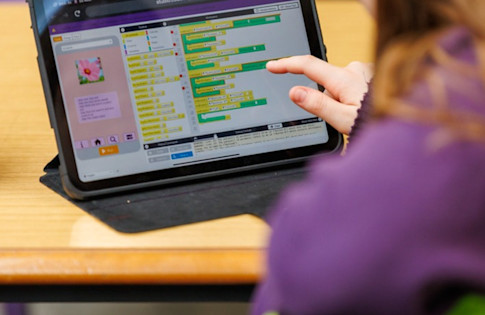
I had some hesitation about [following a technology pathway] because I thought it was something hard that I wouldn’t be able to do. But after seeing what it's really like, and seeing all the job possibilities, I feel like I want to explore more of them.”
Tasneem, Year 8 student at West Bromwich Collegiate Academy
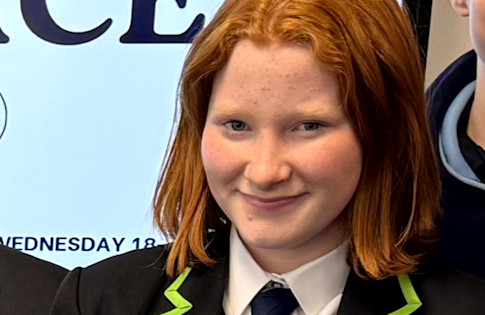
When I started [the course], I had no real interest in Computer Science, but because of this I’ve actually changed one of my GCSE options to Computer Science, which really shows how much this has influenced me.”
Ellie, Year 9 student at Cedars Upper School
Teachers report that the social action focus helps diversify interest in computing. “The course has opened doors for students with varied passions,” says Kamona Karim from Putteridge High School, “They now realise that computing can align with their unique passions and career aspirations. This has been particularly effective in fostering a more inclusive and diverse group of students in our computing courses.”
Our own conversations with students echo these sentiments, showing that applying computing to real-world contexts, in a project-based setting where students use a range of essential skills, helps to challenge stereotypes and increase interest in computing, especially among girls.
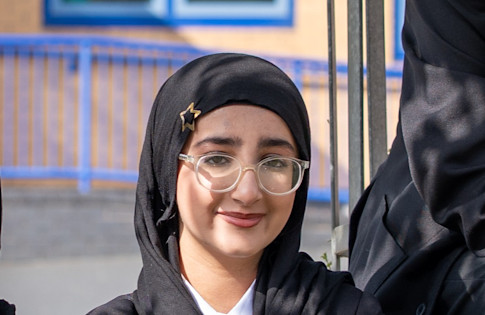
I feel like the Apps for Good course has influenced me to get more involved with computer science ... It's helped us create an app which can impact the world and without computer science it wouldn't really be possible.”
Afareen, Year 8 at Shireland Collegiate Academy
Social action was a key driver for students at The Judd School. The fact that they could make a difference to the world was a standout part of their experience, and increased their interest in technology careers.
From aspiration to action
Kamona has seen first-hand how those intentions translate to action as students move from Key Stage 3 to 4, and we heard about this impact in students’ own words when we visited some Year 10 students at Putteridge recently.
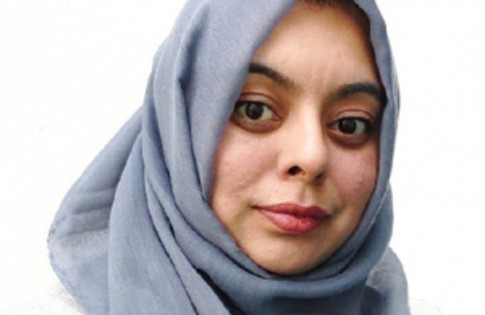
At Putteridge we’ve seen an encouraging increase in the number of girls choosing computing subjects...there has been a notable increase in female participation in the BTEC DIT course, with 30% of the Year 10 cohort being girls, compared to 20% in Year 11”
Kamona Karim, Teacher of Computing at Putteridge High School
Our alumni stories illustrate how long-term impact extends way beyond the classroom and into adulthood. Mohima, one of our first students and now an Apps for Good Trustee, told us that her Apps for Good experience caught the interest of the interview panel for a graduate role in an asset management company, who recommended her for a role in digital transformation.
That set the trajectory of my career on a very different pathway; I was able to do more product management and more digital work which then allowed me to join a start up, which then allowed me to join where I am now.”
Mohima, Product Lead at With Intelligence and Apps for Good Trustee
Others credit their Apps for Good experiences with skills that still influence their work; electronics engineer Matt applies early design principles he learned during his course, while Otto, now a law student, says the course planted the seeds of his commitment to social justice.
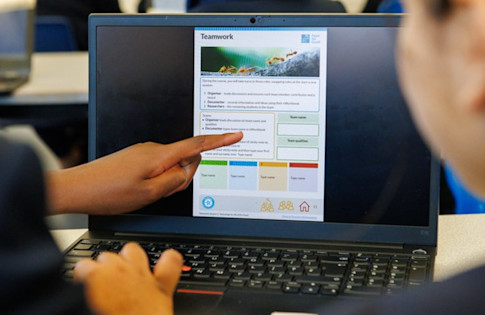
Working with Apps for Good developed a moral compass for me at quite a young age. That definitely had an influence on what came to be a political interest of mine, and how companies, charities and governments can create positive change.”
Otto, law student at Manchester Metropolitan University
Essential skills as a foundation for success
While we hope to broaden young people’s horizons and help increase diversity in the tech sector, it’s equally important to us that students develop the essential skills they need to use their ideas, voices and experiences to change their world. This is a common thread through all our alumni stories.
Mariam, a Year 10 student at Denbigh High School who did an Apps for Good course in Year 7, described how Apps for Good transformed her ability to communicate. “I was seen as very quiet, I was not used to speaking out. Every time I talked, my voice would be a little shaky and I’d get really nervous. When I had to present the idea of Electro Saver to the judges I had to use these skills of talking on the spot and selling an idea”. She credits her Apps for Good experience for helping her navigate similar situations since: “Because I was used to [public speaking] from the Apps for Good course, I knew how to apply that to the Student Council … I'm talkative now, and I don't really get nervous anymore.”
University student and education campaigner Zak told us that working as a team on something that really mattered to him taught him a lot about himself and made him more confident to pursue other opportunities, such as joining his school committee, sitting on the European Youth Parliament and acting as the UK ambassador for the Duke of Edinburgh.
David, who won an Apps for Good award in Year 8 and now works in marketing for Nike, thinks essential skills development is one of the most important aspects of Apps for Good courses: “The things that you're teaching to kids are the things that I do in my everyday life now.” He told us that practising these skills and meeting Industry Volunteers built his confidence and opened up his world.

I think if I never did the course, to be very honest, I wouldn't be where I am now. I wouldn't have the perspective and the openness to understand that with an idea, you can create something and you can get somewhere.”
David, marketing at Nike
Exploring our long-term impact has given the Apps for Good team a deep sense of pride. The evidence shows that our courses influence the choices students make in school, including encouraging them to study computing qualifications. It also shows that our courses inspire many young people to pursue technology careers and - perhaps most importantly of all - equip them with the essential skills and agency to thrive in whatever path they choose.
We are excited to keep following the journeys of our alumni in the years ahead. Are you a past Apps for Good student? Our Impact Manager Lou would love to hear from you - get in touch with her by emailing louise.jones@appsforgood.org.